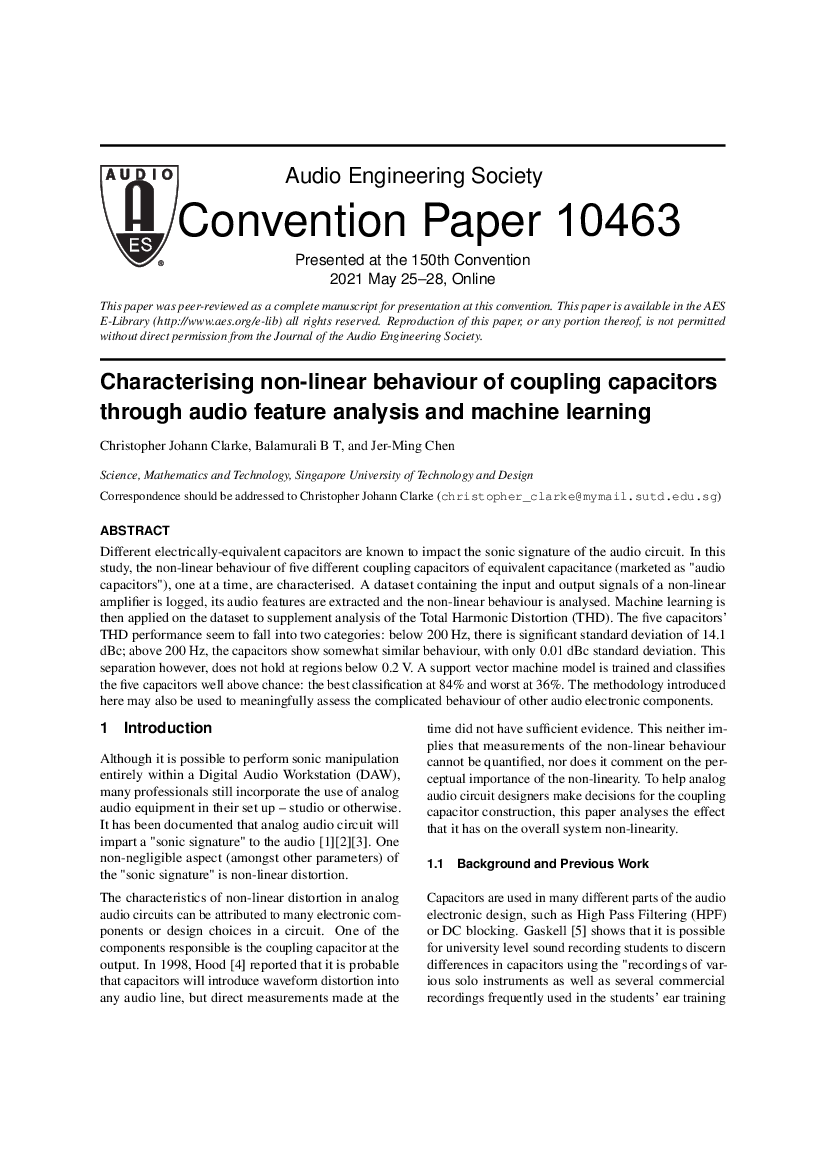Home / Publications / E-library page
You are currently logged in as an
Institutional Subscriber.
If you would like to logout,
please click on the button below.
Home / Publications / E-library page
Only AES members and Institutional Journal Subscribers can download
Different electrically-equivalent capacitors are known to impact the sonic signature of the audio circuit. In this study, the non-linear behaviour of five different coupling capacitors of equivalent capacitance (marketed as "audio capacitors"), one at a time, are characterised. A dataset containing the input and output signals of a non-linear amplifier is logged, its audio features are extracted and the non-linear behaviour is analysed. Machine learning is then applied on the dataset to supplement analysis of the Total Harmonic Distortion (THD). The five capacitors’ THD performance seem to fall into two categories: below 200 Hz, there is significant standard deviation of 14.1 dBc; above 200 Hz, the capacitors show somewhat similar behaviour, with only 0.01 dBc standard deviation. This separation however, does not hold at regions below 0.2 V. A support vector machine model is trained and classifies the five capacitors well above chance: the best classification at 84% and worst at 36%. The methodology introduced here may also be used to meaningfully assess the complicated behaviour of other audio electronic components.
Author (s): Clarke, Christopher Johann; B T, Balamurali; Chen, Jer-Ming
Affiliation:
Singapore University of Technology and Design, Singapore
(See document for exact affiliation information.)
AES Convention: 150
Paper Number:10463
Publication Date:
2021-05-06
Import into BibTeX
Session subject:
ELAC/Audio Tech
Permalink: https://aes2.org/publications/elibrary-page/?id=21056
(2209KB)
Click to purchase paper as a non-member or login as an AES member. If your company or school subscribes to the E-Library then switch to the institutional version. If you are not an AES member Join the AES. If you need to check your member status, login to the Member Portal.

Clarke, Christopher Johann; B T, Balamurali; Chen, Jer-Ming; 2021; Characterising non-linear behaviour of coupling capacitors through audio feature analysis and machine learning [PDF]; Singapore University of Technology and Design, Singapore; Paper 10463; Available from: https://aes2.org/publications/elibrary-page/?id=21056
Clarke, Christopher Johann; B T, Balamurali; Chen, Jer-Ming; Characterising non-linear behaviour of coupling capacitors through audio feature analysis and machine learning [PDF]; Singapore University of Technology and Design, Singapore; Paper 10463; 2021 Available: https://aes2.org/publications/elibrary-page/?id=21056
@article{clarke2021characterising,
author={clarke christopher johann and b t balamurali and chen jer-ming},
journal={journal of the audio engineering society},
title={characterising non-linear behaviour of coupling capacitors through audio feature analysis and machine learning},
year={2021},
number={10463},
month={may},}